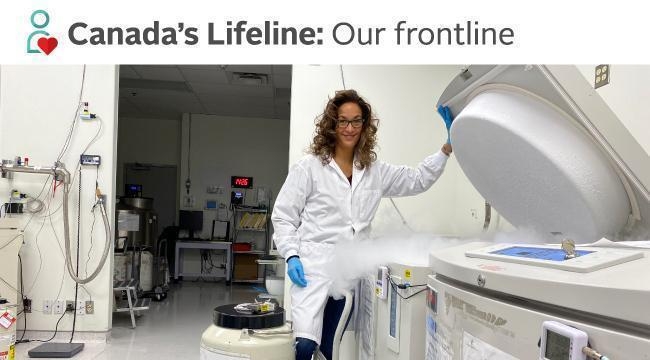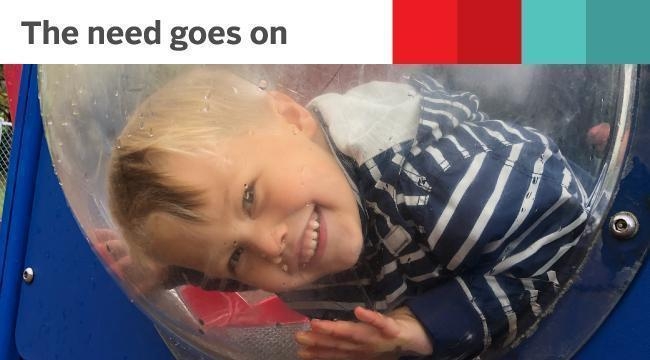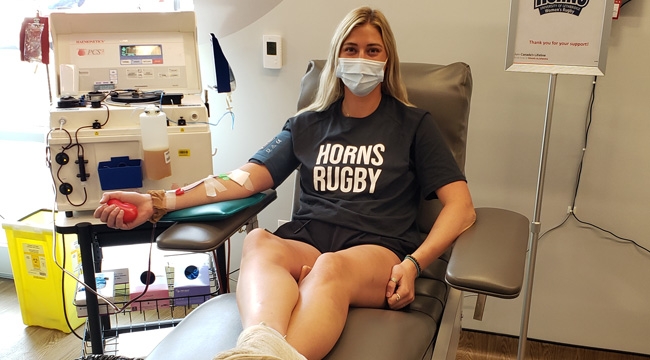Laying the groundwork for a more inclusive blood system
Dr. Catherine Jenkins, scientist and LGBTQ+ advocate, is part of our effort to evolve donor screening questions
Editor’s note: this story and the details shared are with the permission of Dr. Catherine Jenkins. Content warning: please be aware this article contains references to transphobia.
As Canadian Blood Services moves toward more inclusive screening criteria for donors, Dr. Catherine Jenkins is bringing her perspective to that work as a scientist, LGBTQ+ advocate and trans woman.
She’s involved with a research grant, through Canadian Blood Services, studying plasma donation and alternative donor screening questions for gay, bisexual and other men who have sex with men, and some trans, gender-diverse and Two-Spirit individuals. These groups are affected by the current eligibility criteria, which requires a three-month waiting period to donate following sexual contact with a man.
Dr. Jenkins has a PhD in cancer biology from the University of British Columbia and works in public health supporting peer and community resource development to expand access to health care for trans, gender-diverse and Two-Spirit people in B.C. She’s optimistic her research will help accelerate the move toward more inclusive donor screening criteria.
“My hope is that we find some actual behaviour-based donor deferral criteria that will inform a plasma collections program,” Dr. Jenkins says.
WATCH: Plasma is the straw-coloured, protein-rich component of blood which is in high demand for the manufacture of lifesaving drugs for Canadian patients.
“The dream,” Dr. Jenkins continues, “is that the findings then inform whole blood donation as well.”
Canadian Blood Services is supporting 19 research projects investigating various aspects of blood donor eligibility criteria and screening processes for gay and bisexual men who have sex with men. This is to fulfill our public commitment to work toward gender-neutral, behaviour-based screening for all donors.
Before authorizing changes to donor eligibility criteria, Health Canada, our regulator, requires evidence that the changes are safe for patients.
The research projects are generating the evidence to further evolve the criteria and related donor screening questions. With many of the projects reaching their final stages, the researchers are preparing to publish their findings.
In mid-May 2021, Canadian Blood Services made a submission to Health Canada to establish alternative screening and collection processes that would enable men who have sex with men, and some trans, gender-diverse and Two-Spirit individuals, to donate source plasma for the manufacture of medications.
WATCH: How plasma is used in medications
If approved, donor centres in Calgary, Alta. and London, Ont. will be the first to implement the new screening process for source plasma donors beginning in late 2021. It’s a small step toward behaviour-based screening for all donors.
This step wouldn’t have been possible without researchers like Dr. Jenkins. But she admits the decision to participate was a difficult one.
“I’ve taken the approach that it might be possible to make change within the system and so that’s what I’m trying to do,” she says. “At the same time, I’m torn because it sometimes feels like the system is actively working against me.”
As a trans woman, Dr. Jenkins was reminded of that when she donated blood for the first time following gender-affirming surgery. She decided to study her experience with the goal of creating a more supportive environment for other trans donors.
“I always thought I wasn’t going to donate blood again until all trans people could donate. But then I realized that there are going to be trans people who are going to donate, and the experience could potentially be distressing,” Dr. Jenkins says. “So I thought I’d try it, see what happens and provide my feedback.”
Name and gender marker changes pose challenge to donation
Dr. Jenkins booked that appointment to donate blood in April 2020. It would be her first time donating as Catherine, but not her first-ever donation, “and that’s where things got complicated,” she says.
In order to update her file, Dr. Jenkins was asked to provide her old name verbally, a painful and invalidating experience for many trans people. Then, only certain changes could be made at the front desk. The rest had to be processed by a nurse.
“Because of that, I was given the wrong screening questions. When I saw the nurse, I had to explain the entire situation again. Finally, I was given the female screening questions and was able to successfully donate,” she says.
Following her donation, Dr. Jenkins checked her profile on the blood.ca app, unaware that it sometimes takes 48 hours for changes to appear. “The app had my old name, old gender, all that,” she says. “Eventually it updated, but a heads-up would have been nice.”
Dr. Jenkins provided her feedback in an email to us, with examples of how the donation process could be made safer and more inclusive for trans individuals. She suggested giving people the option of writing down a birth name if it’s needed to update a donor file; providing more training on gender-affirming language; and letting people know in advance where potential triggers ― such as that delayed update to the app ― might occur.
Committed to doing better
Canadian Blood Services has made several modifications to address inequity and systemic discrimination after reaffirming our commitment to diversity, equity and inclusion last year. That includes changes to reflect some of Dr. Jenkins’ concerns. We have updated resources and training modules for employees to support trans inclusion. And we have also made changes to our employment application processes, which now include optional and anonymous self-identifying questions for candidates to ensure our hiring processes are equitable for everyone.
We are constantly striving to build more awareness and understanding within the organization to create safer, more inclusive experiences for everyone within Canada’s Lifeline.
“We began this work some years ago and we know we need to do much more, more transparently and more quickly,” says Dr. Graham Sher, Canadian Blood Services CEO. “We have a lot of work to do and we are sincerely committed to doing better.”
The recent submission to Health Canada that would enable men who have sex with men, and some trans, gender-diverse and Two-Spirit individuals, to donate source plasma is a small step. But it is one that gives Dr. Jenkins hope that gender-neutral, behaviour-based screening could quickly become reality. “Right now, with the projects that have been funded and the data being collected, I think there is hope in seeing the policy changed.”
June is Pride Month in Canada and in many countries around the world, and Canadian Blood Services is recognizing the contributions of LGBTQ+ groups and individuals to Canada’s Lifeline. Learn more about our approach as we work toward gender-neutral, behaviour-based donor screening questions for all, and follow along as we share stories of other LGBTQ+ individuals contributing to change at blood.ca/LGBTQCommunities.



